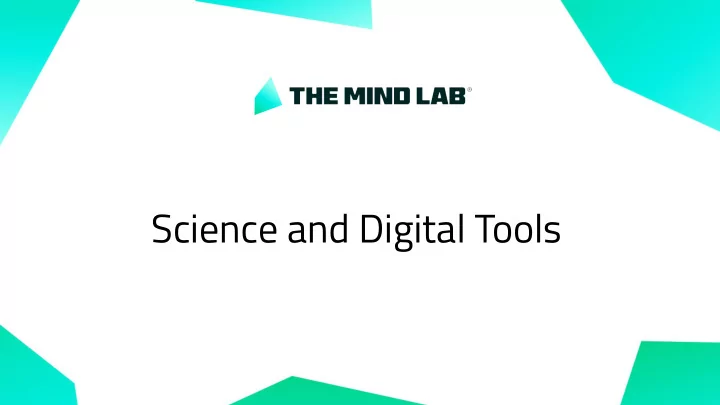

Science and Digital Tools
Digital Science There are increasing opportunities for science to be taught through digital technologies This also contributes towards the integration of the digital technology areas of the curriculum to be deployed in cross-curricular contexts
Sensors The increasing number of sensors available on mobile devices is opening up new avenues for inquiry-based activities that capture data from the environment, and “many mobile devices are equipped with a vast array of sensors and versatile components” These include sensors for motion, position and environment. Dabney, M. H., Dean, B. C. & Rogers, T. (2013, March). No sensor left behind: enriching computing education with mobile devices. In Proceedings of the 44th ACM technical symposium on Computer science education (pp. 627-632). ACM.
Built-in Sensors in Our Smartphones Majumder, S., & Deen, M. J. (2019). Smartphone sensors for health monitoring and diagnosis. Sensors , 19 (9), 2164.
Using Sensors in Applications Sensors can be applied in many different ways. "For example, a game might track readings from a device's gravity sensor to infer complex user gestures and motions… a weather application might use a device's temperature sensor and humidity sensor … or a travel application might report a compass bearing." Android Developers. (n.d.) Sensors Overview. Retrieved from: https://developer.android.com/guide/topics/sensors/sensors_overview.html
Micro:bit Sensors
https:/ /microbit.org/ - Educational Foundation Also materials at: https://sites.google.com/themindlab.com/dclresources/microbit
Micro:bit Science Activity (1) Physically connect a micro:bit to measure soil moisture
micro:bit Science Activity (2) Use the micro:bit temperature sensor and radio connection to configure a remote device to record temperature data over time
Citizen Science Engaging in citizen science allows people to experience, first-hand, the scientific process and engage scientific thinking at the same time as increasing their knowledge of the specific research topic. Citizen scientists are members of the general public that volunteer their time to work and collaborate with professional scientists to collect data and solve problems on real scientific research questions. Masters, K., Oh, E. Y., Cox, J., Simmons, B., Lintott, C., Graham, G., Greenhill, A., & Holmes, K. (2016). Science learning via participation in online citizen science. Journal of Science Communication, 15(3), 1-33.
Zooniverse Zooniverse gives people of all ages and backgrounds the chance to participate in real research with over 50 active online citizen science projects.
Project Types Zooniverse has many project types, and quite a few of these relate to the sciences
Galaxy Zoo - The Original Project “For more than a decade, we've asked volunteers to help us explore galaxies near and far, sampling a fraction of the roughly one hundred billion that are scattered throughout the observable Universe.”
nQuire A Citizen Science platform developed by The Open University in partnership with the BBC. The site allows you to add your own projects (Confidential missions / Social missions)
nQuire Science Some science related missions from the nQuire website
Ahi Kā Rangers Care for the Papatūānuku by Completing Citizen-Science Missions
Experiments With Google Experiments are projects that push the boundaries of art, technology, design and culture. Experiments inspire, teach, and delight. experiments.withgoogle.com/e xperiments Or experiments. withgoogle.com/collection/exp erimentsforlearning
Science Experiments with Google
Microsoft AI Lab Explore, learn, and code the latest breakthrough AI innovations by Microsoft. www.microsoft.com/en-us/ai/ai-lab
Recommend
More recommend